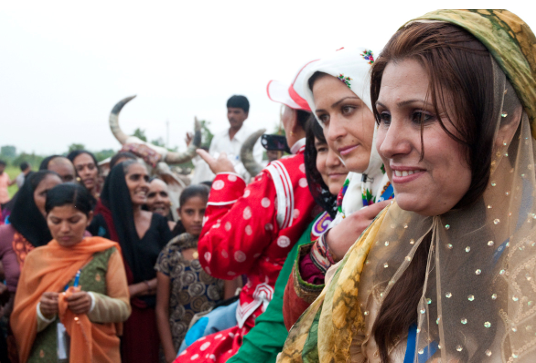As part of the month of Working Women’s Struggle, the voices of pastoralist women resonate strongly from different corners of the world. Their leadership, resilience, and deep knowledge of their territories are essential for the sustainability of their communities and the ecosystems they inhabit. During a recent webinar organized by WAMIP (World Alliance of Mobile Indigenous Peoples and Pastoralists), Mamankhuu Sodnom from Mongolia, Megha Sheth from India, Monicah Yator from Kenya, and Marite Álvarez from Argentina, shared their experiences, challenges, and pathways to women’s empowerment in pastoralism.
Mamankhuu Sodnom, WAMIP’s regional coordinator for Central and East Asia, offers a glimpse into a life deeply rooted in nomadic traditions. As a pastoralist and small-scale dairy producer for over 60 years, Mamankhuu faces the urgent threat of expanding mining companies encroaching on their rangelands. This land appropriation endangers their way of life and, consequently, the livelihoods of women and families who rely on livestock. In response to these challenges, Mamankhuu emphasizes the need to promote the value of pastoralist products and to preserve and pass down ancestral knowledge to future generations, particularly young women. Her active collaboration with the Mongolian government within the framework of the International Year of Rangelands and Pastoralists (IYRP) underscores the importance of ensuring that the voices of pastoralist women are heard and considered in policies that affect their lives.
From the arid and semi-arid region of Kutch, in western India, Megha Sheth, a member of WAMIP and the South Asia Pastoralist Alliance, presented an inspiring example of female leadership in community rangeland management. Recognizing that pastoralism is more than an occupation—it is a way of life that provides solutions to multiple crises—the Maldhari pastoralist women’s alliance launched a pilot project in ten villages. By forming rangeland management committees led by 110 women pastoralists, they tackled the issue of shrinking and degraded grazing lands. These women received training in land mapping, leadership, rangeland development planning, and sustainable restoration practices. The results were remarkable: under their leadership and guided by their traditional knowledge, they submitted resolutions at the local level and secured formal recognition of land titles for 2,080 acres of rangeland. Additionally, they implemented restoration practices such as land clearing, leveling, and the planting of climate-resilient native grasses. This collective effort regenerated and restored over 100 acres of rangelands, benefiting more than 1,020 families. The experience of the Maldhari pastoralist women demonstrates how women’s leadership can ensure both ecological and economic sustainability in their communities while advancing their formal land rights and governance.
From WAMIP in Eastern and Southern Africa, Monicah Yator, a proud Kenyan pastoralist and founder of the Indigenous Women and Girls Initiative, described the deep socio-cultural barriers that women face in their communities, highlighted by their absence from decision-making spaces regarding the commons. Despite being the backbone of their families’ sustenance—often with limited livestock ownership—pastoralist women are severely impacted by environmental challenges such as climate change and floods, as well as political marginalization and a lack of representation in governing bodies. The inadequate infrastructure in their territories further hinders their ability to connect and mobilize. Monicah emphasized the urgent need for policy frameworks that recognize and protect pastoralism in Africa, ensuring land use and ownership rights. She also highlighted the importance of addressing drought resilience and climate adaptation from a gender perspective, along with improving access to social services and education for pastoralist children. Finally, Monicah called for governments to recognize and support pastoralism as a way of life and to protect the rights of pastoralist women who face displacement and livelihood loss due to conflicts.
Marite Álvarez, a representative of pastoralist organizations in Argentina and WAMIP’s regional coordinator for Latin America, emphasized the growing threats to pastoralist territories in the region due to the intensification of extractivism, agribusiness, and tourism. She expressed strong hope that the International Year of Rangelands and Pastoralists (IYRP) 2026 will serve as a crucial moment to address these challenges, including the lack of recognition of pastoralism’s value in Latin America, the absence of policies protecting territorial rights, and the need for greater support for pastoralist organizations through alternative development models and the global visibility of Latin American pastoralists’ experiences and demands. She underscored the importance of participation in global spaces to identify common issues and ensure that the visibility of the IYRP translates into concrete support programs for pastoralist organizations and families, recognizing their contribution to food sovereignty, combating commodification, and ensuring food quality and access to rights.
The webinar also highlighted the critical importance of pastoralism for ecosystem sustainability, cultural preservation, and food sovereignty. As an ancient, resilient, and sustainable way of life, pastoralism exemplifies food sovereignty in action, yet it is increasingly threatened by land grabbing, climate change, and policies that favor agribusiness. In this context, the Nyéléni process, born from the 2007 forum in Mali, was brought up as a beacon of hope for food sovereignty movements. The upcoming 3rd Nyéléni Global Forum in Sri Lanka in September 2025 was highlighted as a key moment for grassroots unity and action, inspiring the path toward IYRP 2026.
The central role of pastoralist women and other small-scale food producers worldwide is fundamental to the survival of their communities and the sustainable management of natural resources. It is crucial to guarantee their land and resource rights, foster their leadership and participation in decision-making, and implement policies that recognize and value their traditional knowledge, as well as their contributions to food sovereignty and ecosystem preservation. In this month of Working Women’s Struggle, the voices of WAMIP’s pastoralist women remind us of the importance of amplifying and supporting their leadership and resilience on a global scale.
This article was produced by Nyéléni’s communications team and have been originally published in the website of the 3rd Nyéléni Global Forum.




